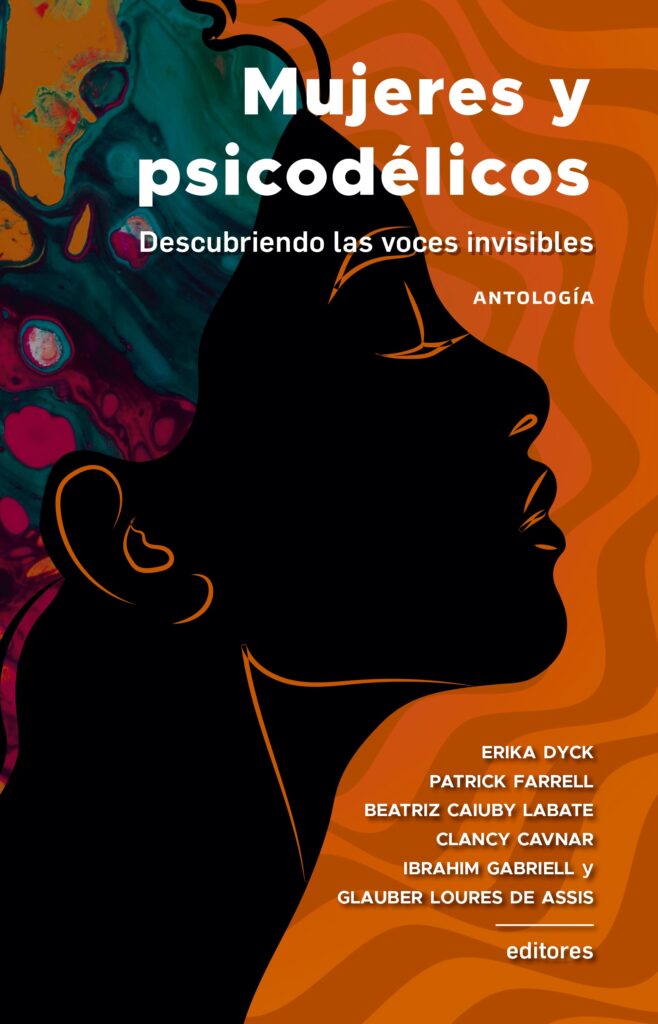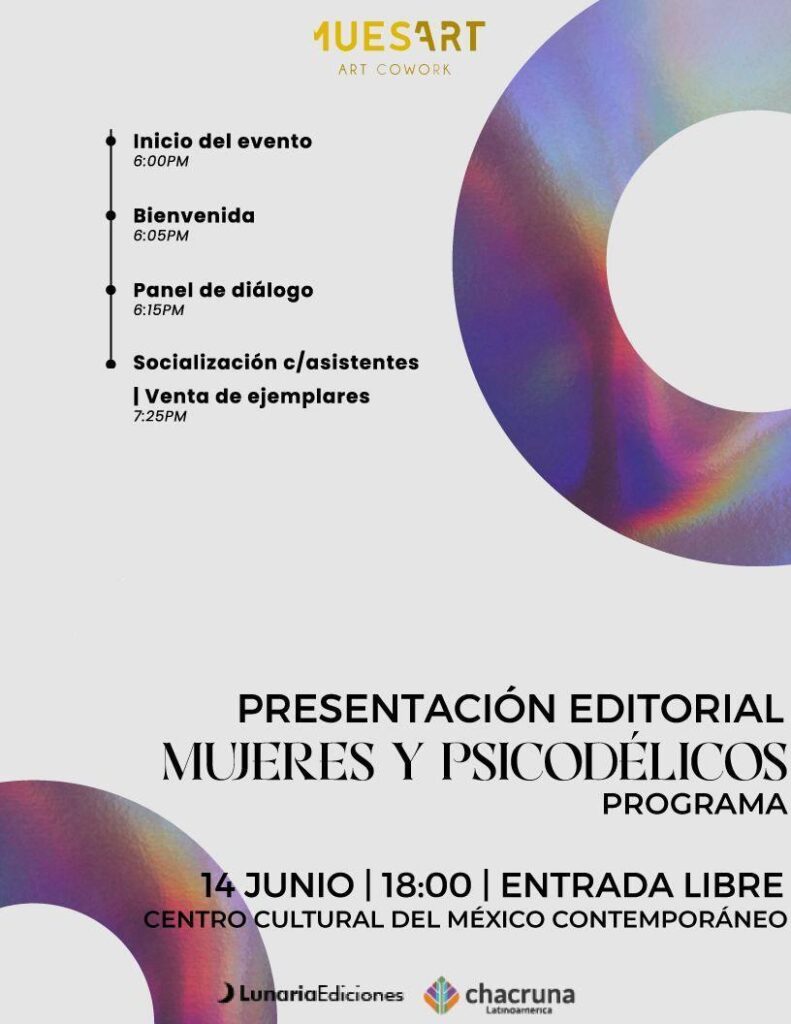Women and Psychedelics: Uncovering Invisible Voices [Book in Spanish]
Women and Psychedelics centers women in the psychedelic movement

The Chacruna Institute announces the publication of Women and Psychedelics: Uncovering Invisible Voices [Book in Spanish], an indispensable new collection of short essays by authors from the Chacruna Institute and Chacruna Latinoamérica. This anthology highlights the pivotal and often underrepresented role that women have played in the psychedelic movement. The book is a co-edition between Chacruna Institute and the Mexican publishing house Lunaria Ediciones.
In its mission to uncover how women have contributed to topics in psychedelics, Women in Psychedelics broadens the conversation beyond the United States to examine women in Latin America. Chapters from English and non-English-speaking writers illuminate the cultural contexts in which women have redefined and shaped psychedelic legacies through historical and anthropological approaches as well as interviews with direct sources.
“In this book, we rethink the place of women in the psychedelic past as we chart a more inclusive psychedelic future,” notes co-editor Erika Dyck, Ph.D. “Whether as nurses, therapists, healers, interns, wives, or subjects themselves, women’s perspectives reveal a more diverse set of priorities when it comes to thinking about the place of psychedelics in the twenty-first century. Stories in this book will surprise readers with the variety and depth of women’s contributions to this rich history.”
This essential collection opens with Pioneers, chronicling the lives and legacies of women who made psychedelic history. Chapters focus on figures including Susi Ramstein, Albert Hofmann’s lab assistant and the first woman to take LSD; Mrs. Amada Cardenas, the first female peyote dealer, in the United States; Maria Nys and Laura Archera Huxley, Aldous Huxley’s first and second wives, respectively, and their experiences with the healing power of psychedelics; and Rosemary Woodruff, whose relationship with Timothy Leary included her decision to break him out of jail.

Feminism in Action profiles movers and shakers in the psychedelic movement, shining a light on their contributions and making space for their fascinating stories. Chapters examine Canada’s pioneering psychedelic forebears, including psychiatrist and Christian missionary Dr. Florence Nichols and Kay Parley, whose experiences with LSD gave her insight into psychosis. Other essays explore topics like the influences of Spiritualism on the burgeoning North American psychedelic movement through the figure of early 20th-century medium Eileen Garrett, and the role Mazatec curandera María Sabina played in psilocybin’s emergence into American consciousness.
The section is followed by Limits of Feminism, a section that contextualizes the complexities of the psychedelic movement for women, who have faced sexual violence, misogyny, and gendered assumptions. Chapters navigate topics of sexual violence in ayahuasca traditions, homosexuality in the Santo Daime religion, the role Indigenous women have played in stewarding gardens of psychedelic plants, and the “drug empress” Lola “The Chata,” who defied gendered expectations of the drug trade as a man’s world to become one of the most notorious traffickers in Mexican history.
Set and Setting looks at the rich ways women have shaped psychedelic traditions, with particular focuses on music in both clinical/therapeutic and Indigenous frameworks. While several essays examine the historic influence of women on establishing the importance of set and setting, the majority of pieces in this section examine ayahuasca traditions, including the roles women play in ayahuasca ceremonies, the rare but important figure of the female shaman, and the synergy that can emerge when Western and Indigenous methods are combined.
The book’s final section, Birthing and Dying, explores how natural processes and psychedelic experiences intertwine. It contains essays on the relationship between psychedelics and natural childbirth, the role of psychedelic plants in fertility control and the regulation of menstruation and other biological processes, death doulas, and the postpartum consumption of ayahuasca in the Santo Daime religion.
“The Chacruna Institute continues to advance our leadership and mission to re-write the mainstream narratives of the field of psychedelics,” says co-editor and Chacruna’s Executive Director, Bia Labate, Ph.D.. “In this volume we celebrate both voices of Anglo and Latin women in an unique comprehensive collection that honors invisible voices of many leaders of the global psychedelic renaissance.”
Chacruna will celebrate a book launch for the Spanish edition of the collection on Tuesday, June 14, 2022, at the Centro Cultural México Contemporáneo, in the heart of Mexico City. The book will be available for purchase at the book launch on June 14.
Learn about the event here, and find more information on the book here.
Book reference:
Dyck, E., Farrell, P., Labate, B. C., Cavnar, C., Gabriell, I. y Assis, G.L. (eds.). (2022). Mujeres y psicodélicos: Descubriendo las voces invisibles. Instituto Chacruna/Lunaria Ediciones.
An English version of Women and Psychedelics will be published in 2023 by Synergetic Press.
Sponsor
About Chacruna Institute
The Chacruna Institute for Psychedelic Plant Medicines, is a 501(c)(3) non-profit organization co-founded by Brazilian anthropologist Dr. Bia Labate and American psychologist Dr. Clancy Cavnar, based in Northern California and with strong ties to Brazil and Mexico. We promote reciprocity in the psychedelic community, and support the protection of sacred plants and cultural traditions. We advance psychedelic justice through curating critical conversations and uplifting the voices of women, queer people, Indigenous peoples, people of color, and the Global South in the field of psychedelic science.
Contact Information
Francisco Rivarola
Chacruna Institute
[email protected]
415-390-6157
Take a minute to browse our stock:
Did you enjoy reading this article?
Please support Chacruna's work by donating to us. We are an independent organization and we offer free education and advocacy for psychedelic plant medicines. We are a team of dedicated volunteers!
Can you help Chacruna advance cultural understanding around these substances?













